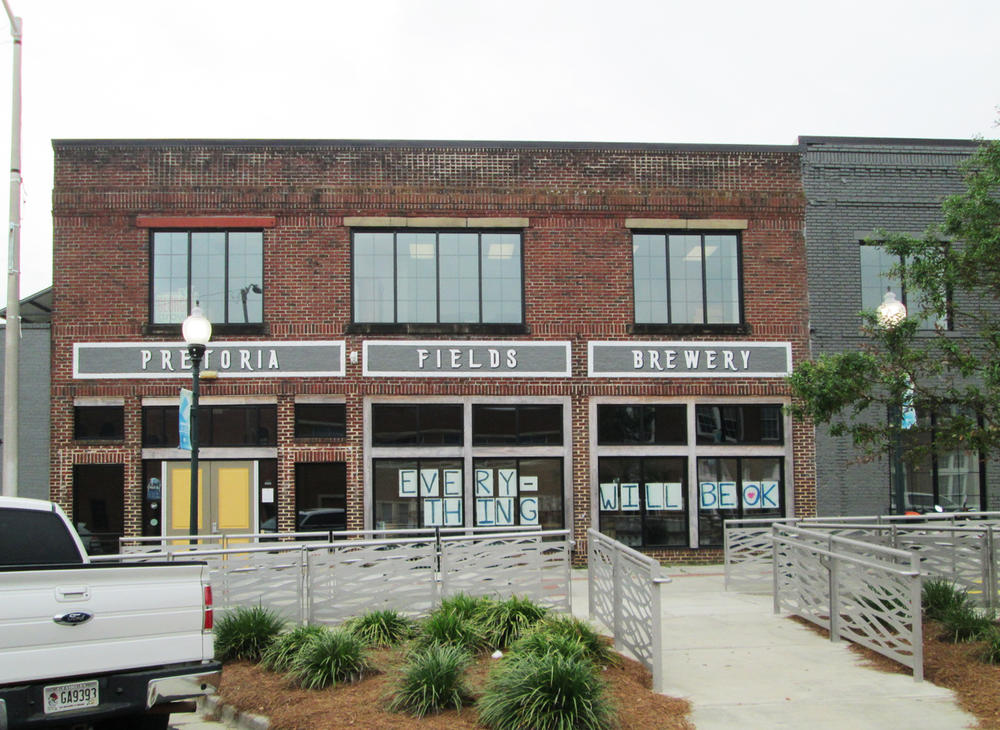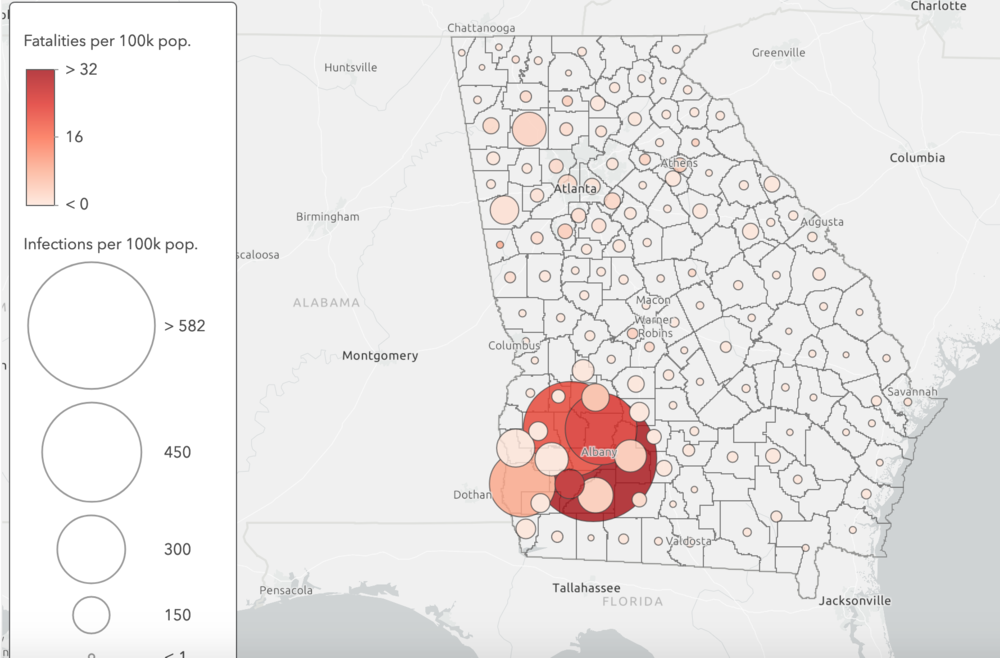Section Branding
Header Content
How Albany Emerged As A Global COVID-19 Hotspot
Primary Content
Dr. LaMont Smith still has a lot of friends at Phoebe Putney Memorial Hospital in Albany. It’s one of the places he practiced critical medical care before he retired.
Coronavirus put retirement on hold, and sent him back to Phoebe Putney for an 80-hour week rotation. And he saw friends, as well as sights that shook him.
“I saw people who I knew were going to die,” Smith said.
The Phoebe hospitals spread across southwest Georgia need the help of doctors like Smith. COVID-19 has killed more people at Phoebe Putney than in Cobb County and Fulton County combined. In terms of per capita measures, the region has now joined the ranks of Lombardy, Italy; Wuhan, China, even New York as one of the world’s hotspots for coronavirus infections.An ER Doctor's Experience Fighting Coronavirus In Georgia's Global Hotspot
Coronavirus brings the fourth federal disaster declaration for the area in the last 22 months. The last was for Hurricane Michael in 2018-2019.
At first, officials at the hospital didn’t know where the first blush of coronavirus infections came from around the middle of March.
“But we think we've narrowed down what the source was, and it was a funeral,” Smith said.
A pair of funerals in late February, in the days before social distancing was something people were told they needed to do, emptied out two large churches and brought in extended families from across the South and the country.
Phoebe Putney CEO Scott Steiner said the funerals were a perfect opportunity to spread coronavirus.
“A lot of crying, a lot of wiping off noses. A lot of shaking of hands, of hugging, of kissing. Touching microphones being used to celebrate the person that has passed,” Steiner said.
In the mix was someone who, unbeknownst to them, was infected with coronavirus. Steiner said public health investigators will have the final say, but the first infections hit the hospital about 16 days after the funeral, at the long end of what we now know is the incubation period for coronavirus.
And now among the dead in Albany is the minister who preached one of the funerals. Family members connected to one of the first funerals are also hospitalized. Even the furthest reaches of extended families are receiving daily updates on kin who are gravely ill.
RELATED: In COVID-19 Hotspot, Handmade Masks Help Stretch Medical Supplies
According to the Georgia Department of Public Health, by the end of March, the five-county Albany metro area had logged 628 infections.
When Smith started his five-day stint at Phoebe Putney Memorial on March 23, the infections were less than a third of that, but what he found was already overwhelming.
“I've been practicing 25 years. I've never seen anything like this before,” Smith said. “What struck me so much was not just the quantity of patients, the number of patients. It was that they were so sick.”
Smith said usually even when emergency intensivists like him are confronted with patients near death, they have time of what he called “dwindling” in which they can have the difficult end of life conversations with friends and family of the ill. Not so with COVID-19.
“These people are basically almost suffocating. And they drop dead,” Smith said. “They have a cardiac arrest. And you don't know when it's coming.”
Recently, Georgia Department of Public Health began reporting whether people who died from COVID-19 had underlying health issues that might have been exacerbated by coronavirus. Statewide, well over half of the dead are known to have had such conditions.
In the Albany area, that number is flipped into the unknown column, reflective of a community that has very little contact with the healthcare system at all and, LaMont Smith said, many pre-existing health issues.
“So people were coming in with underlying lung disease that they're not aware of, Smith said. “But also, cardiovascular issues like hypertension and underlying heart disease also make you much more likely to not do well.”
Add obesity, and you have the list of conditions already epidemic across much of the rural South which leave people susceptible to COVID-19. New CDC data released this week backs up that correlation.
MAP: Track Coronavirus Infections Across Georgia
Meanwhile, Albany and Dougherty County were among the first communities in Georgia to issue aggressive shelter in place orders for residents in order to enforce social distancing. Those orders have not been received without push back, even as police have been freed up to issue citations and fines for violators. That leaves Albany Mayor Bo Dorough searching for new ways to enhance enforcement, even as Albany leads the state in the number of deaths from COVID-19.
“You know, there's been an interesting recommendation that people who are cited for violating shelter in place orders could be placed on a list,” Dorough said. “Then that list could be run against a list of who might receive a personal federal disaster check.”
“And that would disqualify them from stimulus money. I think that might be a very effective incentive,” Dorough said.
Of course, there will be new funerals for the newly departed. Critical care doctor Smith cautioned, for now, tradition has to be set aside for public health.
“So these people who are having church gatherings, who are going around without masks or going to funerals, who don't really have a realistic view of what this thing can do to you? They're putting themselves and a whole lot of other people at risk,” Smith said.
Dorough also wants other cities where pre-existing health and social conditions leave them wide open for coronavirus to see Albany, and prepare.
“I hope this doesn't happen in Columbus, in Augusta, in Macon, in Savannah,” Dorough said. “But by every indication it's coming.”
Maybe those cities can avoid an outbreak like Albany’s while they still have time to act and slow the spread, Dorough added.



